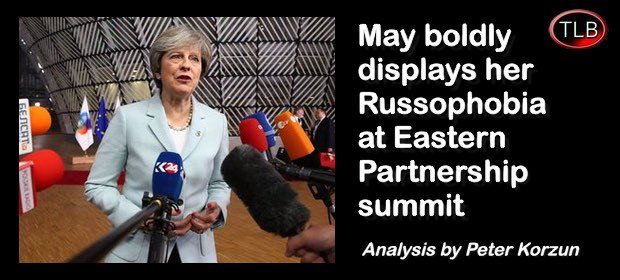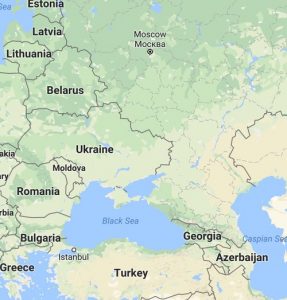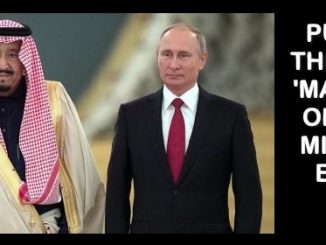
Pam Barker | Director of TLB Europe Reloaded Project
The Eastern Partnership is an EU creation from 2009, launched at the behest of Poland and Sweden, aimed at bringing six former Soviet states under various types of EU control (economic, political, etc.), as Peter Korzun makes clear in the article below. For a general, EU-slanted report on the organization’s recent meeting, ER recommends the following article, Pursuing cooperation despite divisions: The outcomes of Eastern Partnership Summit 2017, from New Eastern Europe site. Korzun is absolutely right in emphasizing that while the EU wants leverage over these countries, it has little or no intention of letting them in as members.
************
British PM Makes It Clear: Eastern Partnership Is Created to Damage Russia
PETER KORZUN
Leaders from the EU and six former Soviet states – Ukraine, Georgia, Moldova, Armenia, Azerbaijan and Belarus – met on Nov.24 to discuss the prospects for deepening ties. Brussels has always insisted that Eastern Partnership (EaP) with the six states is  “not aimed at any country” but it does not sound sincere. British Prime Minister Theresa May left no doubt the EU says one thing but means another when she warned the summit to be on guard against “the actions of hostile states like Russia which… attempt to tear our collective strength apart”.
“not aimed at any country” but it does not sound sincere. British Prime Minister Theresa May left no doubt the EU says one thing but means another when she warned the summit to be on guard against “the actions of hostile states like Russia which… attempt to tear our collective strength apart”.
According to the prime minister, “From agriculture in Ukraine to the tech sector in Belarus – there is a huge amount of potential in the Eastern neighborhood that we should nurture and develop.” This is nothing else but a thinly veiled call for Eastern Partnership non-EU members to shift from Russia to the EU. “But we must also be open-eyed to the actions of hostile states like Russia which threaten this potential and attempt to tear our collective strength apart,” she continued expressly using the word “hostile”. German Chancellor Angela Merkel was more restrained, saying the EU’s partnership with the six states was “very important for our own security.” She did not mention Russia specifically but the meaning was clear. By and large, she meant the same thing Theresa May said.
It’s not words only. Theresa May found it important to emphasize that the UK is about to leave the EU but not Europe, and remains unconditionally committed to maintaining European security. The UK plans to spend £100 million over five years to counter what it calls a Russian “disinformation” campaign in what is called the “Eastern Neighborhood.”
The PM’s personal campaign against Moscow is seemingly gaining pace. Addressing the Lord Mayor’s Banquet at London’s Guildhall on Nov.13, Theresa May launched a crusade against Russia. She called Moscow a “threat to international security” and blamed it for provoking “dangerous and unpredictable” conflicts, “meddling in elections,” hacking the Danish Ministry of Defence and the Bundestag, undermining free societies, and carrying out “cyber espionage and disruption.”
 At the same time, none of the non-EU Eastern Partnership members was given a clear signal that they could one day join the EU. There is no appetite in the EU for eastward expansion. “This is not an enlargement or accession summit,” European Commission President Jean-Claude Juncker (pictured) explained.
At the same time, none of the non-EU Eastern Partnership members was given a clear signal that they could one day join the EU. There is no appetite in the EU for eastward expansion. “This is not an enlargement or accession summit,” European Commission President Jean-Claude Juncker (pictured) explained.
It’s worth noting that Russian officials never said that the UK or the EU was considered as a hostile state or organization despite the anti-Russia policy, including launching the sanctions war. In the given case, it’s not so important what the PM said but rather who it was destined for.
The Eastern Partnership is an EU program aimed at gradual integration of the six states of the post-Soviet space. Armenia and Belarus are members of the Collective Security Treaty Organization (CSTO), the Eurasian Economic Union and other integration projects with Russia’s participation. Five states (except Georgia) are members of the Commonwealth of Independent States (CIS). Ukraine does not take part in the CIS activities but it has not formally withdrawn from the organization. Belarus is a part of the commonwealth (the Union State) with Russia. In practice, it means that Great Britain spoke on behalf of Moscow’s allies calling Russia a hostile state! Is it not an example of outright political pressure? She actually states that “agriculture in Ukraine” and “the tech sector in Belarus” are threatened by Moscow and need the West’s protection! It’s a well-known and undeniable fact that the Belarusian industry would have collapsed a long time ago without orders coming from Russia.
Any time a Russian official expresses doubt about the benefits some EU states get from the EU membership, a ballyhoo is raised about Moscow’s attempts to undermine European unity. But the apparently hostile statements of Theresa May aimed at igniting anti-Russian sentiments are perceived as something normal by EU leadership and bureaucrats.
Is it not strange that the statements in the name of the “United Europe” are made by the leader of the country that is leaving the EU? The UK is a lame duck; it did not represent anybody at the summit but itself. It’s clear that the PM is dancing to Washington’s tune. The statements create a certain environment on the eve of British Foreign Secretary Boris Johnson’s visit to Moscow. As the PM sees it, the head of the Foreign Office is going to making a trip to the hostile state to talk with the enemy.
Speaking about EaP’s non-EU members on the eve of the summit, German Chancellor Angela Merkel said:
“Clearly, the relationship with Russia plays a pivotal role for all those countries. I feel really very happy for this opportunity to conduct a discussion today to know more about the situation in those countries, and I am hopeful that the summit will be a success.”
The statements made by her British counterpart demonstrated that the chances of EaP’s success are zilch, the same as the chances of the six non-EU states to become full-fledged members of the bloc. But the PM’s words confirm the well-known fact: the real goal of EaP is to deprive Russia of the status of priority partner of at least some of the above-mentioned six countries. The EaP is an instrument to make post-Soviet states distance themselves from Moscow and receive nothing in return. Theresa May made the veil fall, with the truth coming out.
************
Original article
ER recommends other articles by Strategic Culture Foundation
About the author
Peter Korzun is an expert on wars and conflicts
Featured image of Theresa May courtesy of AFP/Getty Images




